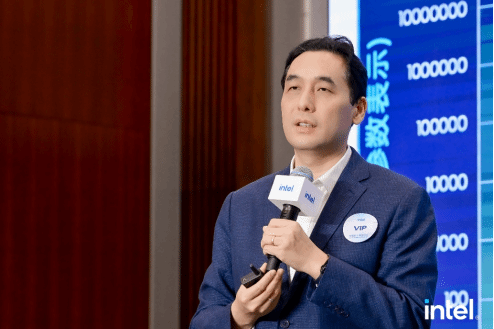From flocking to large hospitals for treatment to ‘treating minor illnesses without leaving townships’, technological forces are promoting the sinking of high-quality medical resources. The ‘Intelligent Imaging Diagnosis Platform’ realizes ‘double-brain’ film reading by experts and artificial intelligence, enabling grass-roots medical institutions to share medical talents and resources. The ‘Intelligent Traditional Chinese Medicine Pharmacy’ solves user pain points throughout the entire chain, from generating prescriptions to dispensing and shipping.
The widespread application of surgical robots in minimally invasive surgeries enables more accurate and personalized surgical treatments. With the improvement of public health awareness, society’s demand for inclusive medical and health care is increasing. The huge potential and practical effects of technology-enabled smart healthcare are gradually emerging. The 2024 Intel Intelligent Healthcare Cooperation Forum was recently held in Beijing to explore how intelligent technologies can bring more efficient and convenient solutions for medical and health services. Song Jiqiang, vice president of Intel Labs and president of Intel China Research Institute, said: ‘Computing power has become the core driving force for the development of the digital economy. With the enhancement of computing power, it is becoming a key factor in promoting the digital transformation and industrial upgrading of all walks of life. At the same time, the continuous promotion of artificial intelligence technology is gradually releasing the innovation potential in the field of medical and health care. Intel is promoting the leap of high-performance computing power through its profound technical strength and releasing diversified computing power to provide customized scene implementation strategies for diverse needs such as high concurrency, high precision, and low latency, and is committed to creating scalable intelligent medical and health solutions.’ At the technical exhibition area of this event, a series of practical cases of technology-enabled equipment fully demonstrate the power and charm of smart healthcare. For example, the AI health assessment and rehabilitation system for out-of-hospital rehabilitation can not only support the assessment of motor ability through AI technology but also continuously improve interactive consultations relying on the local algorithm server. In addition, there is also the borderless clinic based on 2D/3D digital human technology, exploring new medical opportunities of promoting the real with the virtual from multiple diagnosis and treatment stages such as early triage, pre-triage, interactive consultation, and communication of surgical plans. The Shennong Wanteng AI health assessment and rehabilitation system and the remote borderless diagnosis and treatment system based on medical large models. Advanced technology is the solid foundation of smart healthcare and requires the collaborative efforts of the entire industry chain. From in-depth basic research to the construction of software and hardware platforms and the deep empowerment of data, and then to the implementation of demonstration pilots and large-scale promotion, smart healthcare can be truly activated. In November 2023, Intel released the ‘borderless’ medical technology innovation platform for the first time to promote the implementation and transformation of technological achievements including AI in the field of medical and health care and hospital pilots together with ecological partners.Among them, based on the digital human doctor prototype system, Intel’s partners have carried out the development work of triage automation. Through the analysis of a large number of desensitized cases, this system can perform triage for different diseases in multiple departments, with an accuracy rate of over 90%. In 2024, this system also completed the testing and feedback collection in the hospital scenario.
It has wide applicability and can cover multiple medical fields, showing high accuracy and reliability. It is a positive progress for the automation and intelligence of the medical industry. Based on good test results, Intel will optimize the system design in a targeted manner with its partners and start pilot projects in off-hospital scenarios in 2025. In order to bring more high-quality medical resources ‘into ordinary people’s homes’, Wang Peng, director of the Scene and Equipment Innovation Laboratory of Intel China Research Institute, delivered a forward-looking cooperation plan at the event. She said: ‘Intel China Research Institute adheres to the exploration logic of discovery, solution, and promotion. While continuously exploring key technologies, it will also continue to work with ecological partners in the medical, industrial, academic, research, and application fields to meet market demands, accelerate the landing pilots and large-scale application of technological achievements, and achieve two-way progress and coordinated development of new equipment and new scenarios. ‘ Wang Peng, director of the Scene and Equipment Innovation Laboratory of Intel China Research Institute. Intel, relying on its profound technical strength, continuously promotes the practice and application of new technologies in different scenarios. In the field of healthcare, Intel plays the role of a bridge and link, connecting the health needs of the public and the strength of partners in the ecosystem, making technology accessible, promoting technological achievements to effectively serve the actual needs of society, and making healthy life more convenient and popular.

